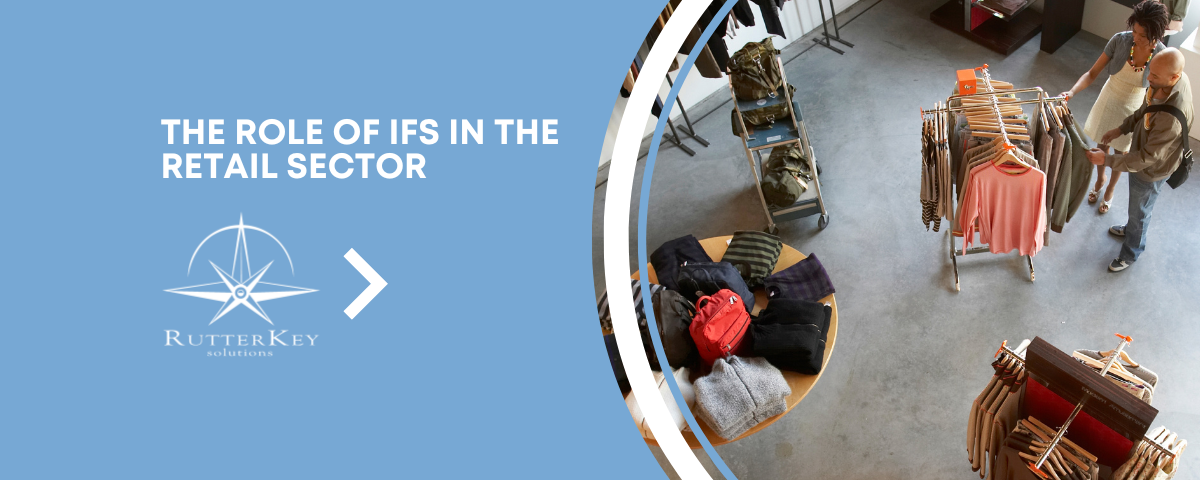
Unlocking the Power of IFS in the Mining Sector
February 27, 2023
Maximizing Efficiency in the Oil and Gas Sector with IFS
March 2, 2023The retail industry is constantly evolving in response to modern technologies, consumer trends, and other external factors. Retailers must find ways to utilize technology to create a more personalized shopping experience, streamline their operations, and better understand their customers.
By embracing advances in technology, retailers can remain competitive and ensure their success in the ever-changing retail landscape.
But how can these businesses keep up with the rapidly changing consumer demands and trends while providing excellent customer experience? What role does IFS software play in pacifying the current challenges businesses face in the retail industry?
Read on to find out.
Retail Industry in the Age of Technology
The retail industry is an ever-evolving, dynamic space. It is constantly being driven and shaped by:
- Technological advancements
- Developing consumer trends
- The never-ending influx of new businesses
The global retail industry is worth trillions of dollars and is an essential part of the world economy. In recent years, the industry has been impacted by the rise of e-commerce, which has shifted the way people shop and purchase goods.
Additionally, the increasing use of mobile technology has made it easier for customers to compare prices, find discounts, and shop online.
Retailers now need the help of leading software solutions like IFS to continue to innovate and adapt to remain competitive in the modern marketplace.
Technological Challenges in the Retail Industry
Retail businesses face a variety of technological challenges, including the following:
Managing stock levels
Accurate and up-to-date stock levels across multiple channels, including warehouses, stores, and online are a must in businesses. As more and more people opt to purchase online, effective supply chain management and capacity handling will pose a challenge.
Processing payments
Retailers must be able to process payments whether in-store, online, or efficiently and securely through mobile.
Delivering a seamless omnichannel experience
Consumers require a seamless shopping experience regardless of how or where they want to purchase a particular product or service.
Providing a seamless omnichannel experience aligned with all customer touchpoints allows businesses to offer customers a consistent and excellent shopping experience.
Poor management of customer data
Through today’s internet and technologies, retailers can collect surmountable customer data every single day. The trouble is, that businesses often amass sets of information that are either incomplete, unclear, or underutilized.
They often struggle with tracking, collecting, analyzing, and structuring volumes of data they gather on every customer interaction.
Cyber security and data security
Security breaches, such as data theft, malware, and phishing have become rampant in the retail sector, especially on e-commerce sites. Retailers must always find ways to safeguard their business and sensitive customer information against hackers that infiltrate their systems through increasingly sophisticated means.
Benefits of IFS in the Retail Sector
IFS is a software suite that helps businesses manage and automate core business processes. It can be in businesses involved in various industries, such as finance, human resources, supply chain, asset management, and retail.
It helps businesses to increase efficiency, reduce costs, and improve customer service. It also provides visibility into operations, allowing businesses to make informed decisions.
As for the retail sector, businesses can take full advantage of the following:
Improved visibility into inventory and sales data
IFS software provides visibility into inventory and sales data, allowing retailers to better manage their stock levels and identify areas of opportunity.
Automation of business processes
Retailers can automate their repetitive and regular processes like order processing, ordering, receiving, and even customer service support activities.
Automating processes helps businesses to save on costs, and at the same time, boost their productivity.
Optimized customer service
IFS software solutions enable retailers to provide better customer service by (centrally) managing orders, tracking shipments, and providing customer support.
Automated data analysis
Another excellent feature of IFS is automated data analysis which helps companies identify trends and opportunities that foster commercial growth.
Increased sales efficiency
Through IFS, retailers can efficiently manage their sales processes, from creating quotes and processing orders to tracking, shipping, and billing.
Better scalability
Retail businesses can easily scale up or down depending on their requirements. This helps them to easily adjust to fluctuating customer demands, for example during busy festive periods.
IFS in the Retail Industry: Looking Ahead
In 2023, the retail industry is mid-way through an instrumental digital revolution, and enterprise software solutions like IFS are for many operators, at the forefront of this shift. Software like IFS provides retailers with a vast range of innovative tools to drive this transformation forward in a consistent, initiative-taking manner.
Retailers gain access to real-time analytics, automated customer insights, and advanced reporting capabilities, to name but a few critical benefits. Elements of business management such as these allow retail businesses to understand customer behavior and create personalized experiences for shoppers in a way not possible before.
Enterprise software provides companies with the ability to create an omnichannel experience for their customers, which as mentioned earlier, is critical to maintaining success and a point of difference with retail customers.
Shoppers can and more importantly want to purchase goods from any platform, such as an online store, mobile app, or in-store kiosk. This information feeding back into a central ‘place’ of management is monumentally beneficial for retailers.
Retailers can better manage their inventory with IFS and ensure that customers have access to the products they need when they need them.
The future of the retail industry is most certainly bright and exciting, with IFS poised to play a key role. As more retailers adopt digital tech to support their operations and growth, IFS will become increasingly essential for streamlining and automating daily tasks, overseeing top-down management, and enhancing the overall customer experience.
Find out more by filling in the form below.




